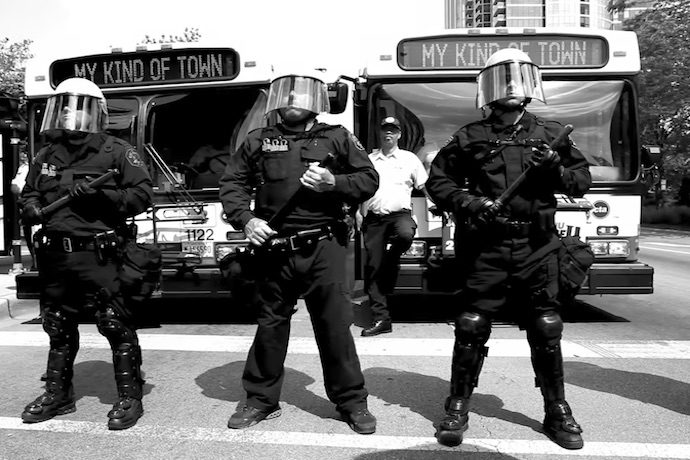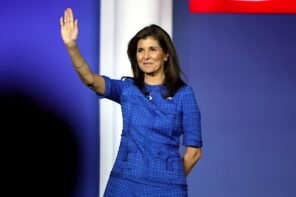The NRA released a terrifying recruitment video the other day, unsettling even by their standards, issuing all but a call to arms to battle protestors, liberals, and anyone else standing in the way of the Trump agenda. The Washington Post‘s Peter Holley describes it:
In the ad, [conservative commentator Dana] Loesch accuses “their” ex-president of endorsing “the resistance,” a movement of demonstrators who “smash windows, burn cars, shut down interstates and airports — bully and terrorize the law-abiding.”
“The only way we stop this, the only way we save our country, and our freedom, is to fight this violence of lies with a clenched fist of truth,” Loesch concludes. “I’m the National Rifle Association of America and I’m freedom’s safest place.”
Holley gets the context of the video right, I think:
If Loesch’s rhetoric is an attempt to draw battles lines and stoke outrage, she’s feeding into a clearly-defined narrative that exists among right-wing websites on the Internet, one that views a clash between conservatives and liberals in almost prophetic terms.
I think Holley means “apocalyptic terms” here, implying a final battle between good and evil. No matter, the point is made: the worldview of this video is stark, antagonistic, and manicheaen, drawing sharp and exclusive boundaries between those on the NRA’s side and those outside their camp. Loesch’s utter revulsion for the latter group is really something—and by “something,” I mean “ugly and more than a little disturbing.”
While the NRA video isn’t explicitly religious, it seems like a perfect example of something I mentioned in my piece on Democrats’ supposed religion problem the other day. I want to draw out some the implications of that line of thought. (Fair warning: they take us to a fairly dark place.)
I’ve been assuming as I’ve written on the subject over the years that the problem with American discourse on religion and politics was religious people’s inability to tap into their moral thought in a creative, compelling, and responsible way. Up until recently, I might have said the religious response to a video like this was inadequate because it refused forthright criticism, or eschewed political action for vague platitudes about loving the neighbor or being at peace. There’s still some truth to that.
These days, I see a deeper, more systemic problem. People tend to assume on some level that moral values are universal. They’re not. We all walk around with the idea that everybody wants more or less the same thing, morally speaking. In other words, we imagine that our own ethics are reflective of universal moral principles, and it just doesn’t work that way. One might assume, for example, that arguing against calls to shoot fellow citizens over political disagreements would be uncontroversial. And then one wakes up to the reality of Dana Loesch in an NRA video. Dana Loesch does not give a rolling f**k at a donut what you think about right and wrong:
“I hardly think that condemning violence is inciting violence,” she told the New York Times when asked to comment on the video. “I think the ad is very clear — there are excerpts from actual riots that are included in the ad, and that’s exactly what I’m addressing.”
https://twitter.com/martynlenoble/status/880285143105118208
https://twitter.com/DLoesch/status/880287503265280000
Most Americans root their moral precepts in faith, or at least they say they do. And Americans are practical universalists in some important senses. They like to think that “God is bigger than those things which seek to divide us,” as Rev. Traci Blackmon preached today; that although each faith has its own peculiarities, in the end they all point back to the same God with the same commandments for good people.
But faith, it turns out, is highly contingent on social location. We know God by where we grew up and who we grew up with. African-American Christianity is not the same as conservative white evangelical Christianity, though they share many social values. Both are different from liberal Christianity. All these strands share the same name, the same scriptures, and many of the same practices, but they’re nowhere near the same thing. And on and on it goes through the many different iterations of race, class, gender, and religion in America. Even the lack of faith reflects the cultural contingencies of social location, particularly of the highly educated, and those particularities show up in voting patterns.
Faith, then, serves in many ways as the moral demarcator of in-group boundaries, the ideology of the tribes. Don’t kid yourself: we all have a tribe. That doesn’t make faith any less true or meaningful. It’s very meaningful and provides moral guidance for the people who hold it in that particular place and that particular time and that particular community. If you don’t share the faith of the group, most likely you don’t really belong to it.
In short, religious belief and practice are marks of identity in American society in the year of our Lord 2017. And as it happens, there is quite a bit of evidence emerging that American politics these days revolves around questions of identity, exacerbated by a growing urban-rural divide. This is what I mean when I say,
faith—or the lack thereof—reflects coherent, competing worldviews. Should America be a racially, religiously, and sexually pluralistic society? Or should it be run by and for the benefit of white Christians with “traditional” sexual mores?
Perhaps I wasn’t clear enough here: it’s not that there are only the two worldviews. As many cultural perspectives exist as Americans, maybe more. But the views mentioned above are the two most salient to contemporary American politics, and the ones most people sort themselves by. Even the seemingly interminable debates over whether Democrats are “faith-friendly” enough revolve around this dynamic, focused on whether Dem policy should respond to an increasingly secular coalition, or whether the party should make concessions in hopes of keeping the remaining traditionalists on board.
As I say, we tend to assume that our expressions of faith or values can bridge these divides—again, that “God is bigger than those things which seek to divide us.” It never works. The secularization of our culture deprives religious discourse of its power. That’s neither a good nor a bad thing: it simply means that the assumptions have changed about which container for our values are normative and which are not.
Increasingly, it’s the values of the tribe that matter most. The deepening cultural divides that we see turning up in voting patterns and attitudes toward race and immigration are reflected even in religious attitudes. That means religious discourse and argumentation about politics and policy is bound to end with groups talking past one another. Rev. Barber says “It’s immoral that we’re even having a conversation about taking away healthcare from millions of Americans.”
Conservative evangelicals couldn’t care less, even though they theoretically share Barber’s faith. Their in-group norms say that social programs go to undeserving people and increase reliance on government rather than God, and that’s all they need to know. Even the most Christian of liberal Christian pleas will go in one ear and out the other. God help you if you’re a member of “the resistance” in some gun nut’s crosshairs, even if you’re wearing a clerical robe and stole. As we saw with James Hodgkinson, violence seldom stops to check for shared values, which is exactly why you don’t do things like put out videos that egg-on the unstable.
I am honestly baffled sometimes by religious liberals who still think that America’s political problems could be solved if we were essentially all nicer to one another, if we listened more and judged less. The divisions we suffer through in the age of Trump are rooted in culture and society, and they result in individual action, rather than the other way around. We all have responsibility for our personal decisions, of course. That’s nowhere more true than when it comes to acts of violence. But solving political problems through individual change is a fool’s errand, because it doesn’t get to the root of the problem, which is a broken, divided society. Likewise, appealing to shared values won’t work, because precisely one of the divisions is in how moral values are formed and implemented.
Here’s where it gets really dark. Faith can’t bridge the chasm between worldviews in part because those worldviews often see competing moral visions as fundamentally illegitimate. At the same time, we depend on shared values to confer legitimacy on our political leaders. The Founding Fathers were explicit in calling for their politicians to set aside “faction” in favor of the American project. But the singularity of that project was always bullshit, most notably in its equally explicit rejection of a role in the political body for African Americans, a rejection enforced in no small part by depictions of blacks as violent marauders who must be kept in check by the rights of white gun owners. That effort continues, as we have seen.
Now that the fraud has been exposed and there is little, if any, agreement on what the American project is or should be, there is correspondingly less agreement on who ought to lead the nation. That disagreement is in turn based on disagreements about who counts as an American, and whose moral framework should be the norm. You don’t get an ad like the NRA’s, or Charisma magazine conflating anti-government rioting in Venezuela with street crime in Louisville, Kentucky when you’re all one big happy family who can hash out their differences over the dinner table. Whatever happened to Christians not bearing false witness, by the way?
Priests used to crown kings in the name of God. We still do, actually. Except “God” is a set of supposedly universal moral values, which turn out to be less universal than tribal, and the tribes can’t agree on what they are or who embodies them. Even worse, the tribes are in increasingly bitter competition with one another, and their values reflect it. For a very diverse democracy, that’s a bad place to be. We’ve lost the master thread that held the system together, and the thing we depend upon to re-connect us doesn’t actually work.
So, that’s it? We should just go out in the woods and let ourselves be eaten by a bear, as one commenter suggested? Well, no. Here’s why.
We count on our morals—derived from religious faith or otherwise—to supply us with the answers to political questions. But the questions themselves are changing, as is our understanding of religion. We can’t overcome political differences through faith talk because we can’t come to even overlapping consensus because our society is changing, a change reflected in our politics.
Once Americans as a society have come to terms with the changes they are experiencing, the faith talk will regain its potency. It will serve to bridge divides. That will always be a contested process, so it’s not necessarily good news, depending on who gains the upper hand. But it will happen, sooner or later. In the meantime, we live through strange days and evil times, with wars and rumors of war, hoping that some damn fool doesn’t start an actual civil war.





